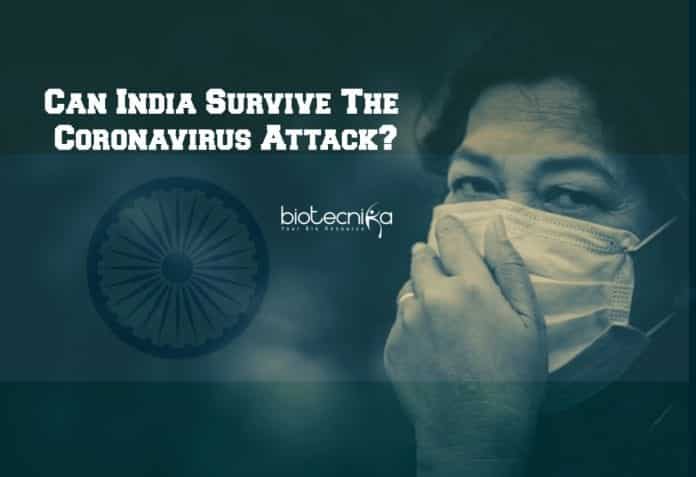How is India fighting Coronavirus
Coronavirus Outbreak In India / COVID-19 Outbreak in India
After China, India – the second most populated country with more than 1.3 billion people, is set to face the coronavirus pandemic. The novel coronavirus outbreak – COVID-19 has infected more than 1,98,00 people in 110+ countries and territories across the globe, with the death toll of more than 4,500 deaths, since the time it began in Wuhan, China During December 2019.
Experts worry that India could likely have more cases than the conservative numbers being reported currently.
The World Health Organization said that India is responding with urgency as well as transparency as the country has so far conducted nearly 5,000 COVID-19 tests. As of 18 March 2020 12:00 pm, the number of confirmed COVID-19 cases is 147 and there have been 3 deaths so far. However, the director of the Harvard Global Health Institute, Dr. Ashish Jha said that he believes that there must be many more cases as there could have been a lot of community transmission as there is no widespread testing, we might just not be aware of it yet.
With the testing capabilities improving, he expects to see a large
uptick in the cases over the next two to three weeks. Jha and other experts worry that the government’s misinformation and unproven homeopathic remedies and BJP lawmakers touting cow products to prevent the infection is adding to the country’s challenges in controlling the outbreak.They also say that in India, enacting strict social distancing measures like the quarantines and lockdowns used in China and Italy would be almost impossible given that India has many overcrowded and rural areas. The hardest ones hit in the potential widespread outbreak will be ones living in poverty.
How is India fighting the Coronavirus Outbreak?
- COVID-19 Tests: The government conducts the COVID-19 tests for free in only government-run hospitals. Across India, at least 52 labs can test for COVID-19.
- Avoid or Postpone Mass Gatherings: Until the spread of COVID-19 is contained, the Indian government has recommended the residents to postpone or avoid mass gatherings, this includes the popular global cricket tournament, the Indian Premier League.
- Travel Restrictions: Excluding certain special exemptions, diplomatic and employment visas, India announced the suspension of “all existing visas” until April 15 on Wednesday. To the foreigners who are already in India, this does not apply. Starting on Friday at 12 PM, no more tourists will be able to enter India. The authorities said that all incoming travelers to the country, including Indians, who had visited Italy, China, Germany, Spain, France, or Korea after Feb 15 would be quarantined for at least 14 days. According to health officials, more than 1 million passengers have so far been screened at airports. From COVID-19 affected countries, including Iran, China, and Japan, the Indian government says it has evacuated more than 900 people so far and all Indian citizens have been advised to avoid all non-essential travel abroad.
- Quarantines: After the outbreak in India, the Defence forces in India are aggressively building quarantine. The first quarantine facility was set up on January 31, the Indian Army set up a coronavirus quarantine facility near Manesar in the National Capital Region. Near Delhi-NCR, there are two more facilities operated by the Air Force. In Suratgarh, Jaisalmer, Jhansi, Jodhpur, Deolali, Kolkata and Chennai, the Ministry of Defence set up seven more facilities. To treat coronavirus patients, the Indian Navy set up an isolation camp at its INHS Asvini in Mumbai. In other places, many hospitals have set up isolation wards.
- Shutdowns: In many places, all public places vulnerable to spread the infection have been shutdown. In Delhi, all schools, colleges, cinema halls have been shut till March 31. In Karnataka, all government colleges, schools, malls, theaters, swimming pools have been shut down till March 28. Kerala has postponed all the govt-public functions. Maharashtra has also shut many of its public places to fight the outbreak. Many cooperate and IT companies have provided work from home to their employees in order to prevent the risk of infection.
Challenges in The Health Care
Experts are worried that now community spread is more likely to drive a national epidemic than foreign cases.
According to experts, the ones most at-risk to get the COVID-19 infection are elderly individuals with underlying health conditions. It was noted that in India, there is a high prevalence of diabetes and cardiovascular disease. Respiratory diseases could be caused by the poor quality of air in urban centers, which pose as another less obvious threat. Another threat is to the people living in poverty, especially because public hospitals lag behind in quality and private health care is inaccessible and expensive to many. Last year, according to a World Bank brief, around 176 million Indians were living in extreme poverty as of 2015.
Jha says that for the number of people likely to get infected, India lacks enough hospital beds. In India, many public hospitals lack staff, overcrowded and not patients have reported to not have a good experience.
Identifying people with symptoms early so that they can be isolated is the key to manage the COVID-19 outbreak. However, until people show advanced symptoms and would have spread the disease already, they often do not come forward and get tested.
Experts also believe that in India, it is not “remotely possible” for taking extreme social distancing measures like those taken by Italy and China, because of the huge number of people living in crowded conditions and slums. There is also overcrowding on public transport as well as public spaces like markets, given that India has a remarkably dense population.
Misinformation Spread Through Government
Throughout the country, there have been many misconceptions about coronavirus sweeping through majorly through Whatsapp. Alternative medicines, questionable advisories about homeopathy and Unani (a type of herbal practice) was promoted by the Indian government through the Ministry of AYUSH, as ways to fight COVID-19. Public health experts have widely dismissed homeopathy as it is not effective for any health condition.
In another case, A BJP lawmaker in Assam, Suman Haripriya suggested that cow urine and dung could be used to cure the coronavirus.
Hearing such novel approaches to combat the virus has left the health experts and Jha frustrated. It is common for misinformation to spread during an outbreak across different countries, however, India’s problem involves more than just arbitrary messages as these misinformations is from the government. Since it is coming from influential people, it is a lot more dangerous.
5 Steps Urgently Required To Fight COVID-19 Outbreak in India
With the risk of community transmission, there could be thousands and thousands of people getting infected or are already infected and are not detected yet.
Looking at how the government is handling the coronavirus outbreak, many health experts warn that India is making a terrible mistake of not testing enough people.
India needs to take these steps immediately in order to fight coronavirus:
1) The private sector must be allowed to test for the virus. After the government invoked an 1896 Act, which was designed and enacted to tackle the plague, private labs are banned from conducting these tests currently.
2) Many international testing kits that are in use abroad are banned in India. Other countries like Europe and the US have used these tests.
3) At government hospitals, the current practice of people standing in a queue must stop. People are potentially infecting each other while they wait in a queue. The procedure to follow could be collecting nasal swabs from people’s homes and then testing the samples. A huge number of collectors would be needed for this. India can provide this vital service only by including the private sector.
4) There must a large number of funds set aside by the government to make the testing free.
5) The ban on infected patients being admitted to private hospitals must be lifted by the government. Rather, private hospitals must be insisted to take in coronavirus patients and create isolation.
Editor’s Note: How is India fighting Coronavirus, COVID-19 Outbreak in India, How is India fighting Coronavirus, COVID-19 Outbreak in India, COVID-19 Outbreak in India, COVID-19 Outbreak in India






























